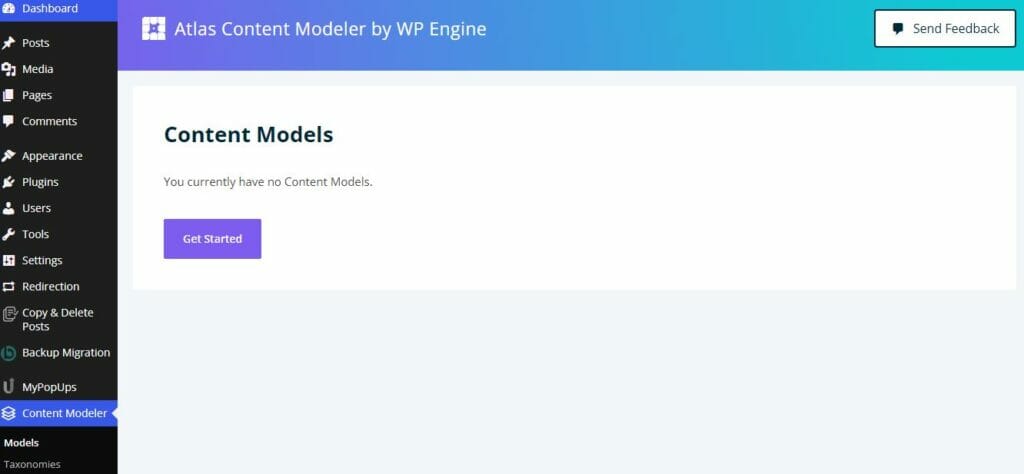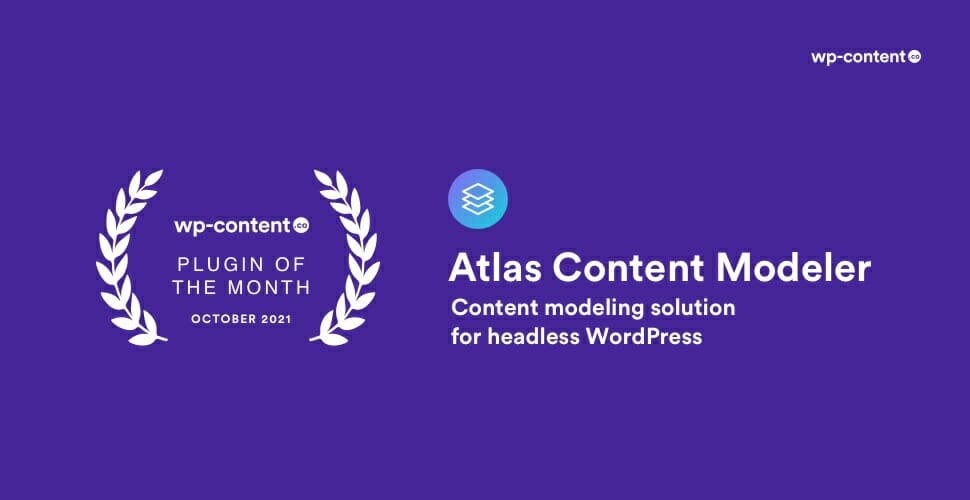Atlas Content Modeler, the free plugin released recently by the WP Engine has been making waves in the headless WordPress space and we thought we would introduce it to our dear readers as the WP-Content.co plugin of the month. So let’s take a look at the amazing plugin in detail. But before that, we need to understand the prevailing custom content modeling situation.
Custom Content Modeling Today
In spite of all the user-friendly features in WordPress, it is sad to say that WordPress does not have custom content modeling as a core feature. Developers currently overcome this shortcoming by using multiple WordPress plugins and WPGraphQL extensions – which can be frustrating at times.
Developers are mainly using the following plugins to create the content models for headless WordPress sites:
- Custom Post Type UI (to register your custom post types and taxonomies)
- Advanced Custom Fields coupled with WPGraphQL for Advanced Custom Fields (to expose custom fields in the GraphQl schema)
- MB Relationships and WPGraphQL MB Relationships (to create efficient many-to-many relationships between posts or users)
They are forced to work with several plugins none of which are well-designed or user-friendly as the native modeling tools for headless-first CMSs.
Atlas Content Modeler to the Rescue
“Creating custom content models is one of the first things you need to do in any digital transformation project, because it’s the glue between the marketers who create and manage content and the website developers who consume that content,” said Jason Cohen, Founder and Chief Technology Officer at WP Engine. “This shouldn’t be hard to do! That’s why we developed the Atlas Content Modeler. We want to simplify and accelerate WordPress development by giving developers a beautifully designed, intuitive tool that takes care of their content modeling needs in one open source plugin.”
Atlas Content Modeler (ACM) is introduced as a content modeling solution for WordPress. Using an intuitive interface, you can create custom post types, as well as custom fields and taxonomies for those post types, with ease.
Developers get a modern content modeling system that automatically integrates with WPGraphQL and the WordPress REST API doing away with the need to write code or install other plugins while publishers get friendly and familiar content entry pages.
Advantages of using Atlas Content Modeler
- 3 tools in 1: You can create custom post types and fields in WordPress, and integrate it with WPGraphQL for headless projects in a single package while ACM standardizes a development team’s toolset in one plugin for content modeling.
- User-friendly: The plugin is intuitive and easy to use. Documentation for advanced features is also available.
- Create custom taxonomies: With ACM, developers can define taxonomies that help their content producers organize their content in a flexible manner.
- Advanced fields, by default: Developers can create schemas that include Rich Text, Media, Numbers, Dates, Boolean and Relationship data fields.
- Define relationships between content models: ACM comes with the ability to define relationships between content models, which adds both structure and meaning to content. With ACM, developers or content editors can also connect individual entries to each other.
Setting up Atlas Content Modeler
You can download and install the plugin from the WordPress repository. Developers should also install and activate the WPGraphQL plugin to be able to fetch model entries with GraphQL.
From the WordPress admin sidebar, click on ‘Content Modeler’, then click the ‘Get Started’ button to create a new model easily.

WP Engine & Headless WordPress
WP Engine is a trusted brand for developer-centric WordPress products including managed WordPress hosting, enterprise WordPress, Headless WordPress, Flywheel, Local and Genesis. They had introduced Atlas, its new Headless WordPress product line in March 2021. Atlas brings together the customer’s choice of modern development framework with powerful front-end Node.js hosting and headless WordPress all in one complete package.
Now ACM joins WPGraphQL, a free, open source WordPress plugin that provides an extendable GraphQL schema and API for any WordPress site, and Faust.js, the open source, front-end framework for building Headless WordPress sites as a member of WP Engine’s Headless WordPress toolset.
Final thoughts
The plugin is quite young but it has immense potential. Developers no longer have to fumble around multiple tools that weren’t designed with headless WordPress in mind and then worry about exposing their data in the REST API / GraphQL schema. Instead, they can use this simple plugin to register their custom content types and automatically expose them via REST/GraphQL.
Also read: WP-Content.co plugin of the Month September 2021 – Reusable Blocks Extended
Also read: WP-Content.co plugin of the Month August 2021 – Koko Analytics



